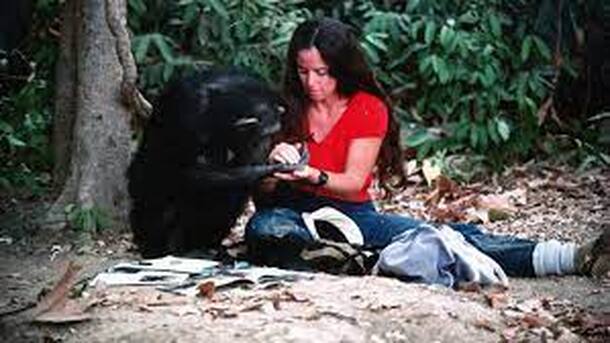|
Although this new HBO Max Documentary (coming Thursday, April 29th to the platform) is called "Lucy the Human Chimp," a more appropriate title might have been "Janis the Chimp Human." That's because its story really isn't about Lucy, a chimpanzee that was raised as a human for the first years of her life as part of a scientific study in mid 60s. It's more about Janis Carter, a caretaker who became so attached to Lucy, that she dedicated the rest of her life to helping Lucy and chimps like her acclimate themselves back into their natural habitats. It's a truly fascinating story, but relying heavily on dramatizations and the same few photos, it doesn't lend itself well as a full-length documentary film. Grade: C+Man, the 60s, am I right?? It was a time of exploration and discovery, and cases of animal cruelty that would never be allowed today that were OK'ed at the time in the name of "scientific research." It was 1964 when a University of Oklahoman psychotherapist named Maurice Temerlin, Ph.D, and his wife, Jane, basically took a baby chimpanzee into their home. Naming her Lucy, they were to see if a chimp raised by humans would eventually adopt more human-like attributes and smarts, or if they are, in fact, wild animals. It was a question of nature vs. nurture and the Temerlin's had the enthusiasm (and the wealth) to pull it off. Along the way, they hired a young grad student by the name of Janis Carter. Janis was given strict instructions not to interact, touch or even go near Lucy...she was there just to clean up after her, feed her and then get the heck out of there. But Janis was not able to stand idly by. She formed a bond with Lucy, one that would last the rest of their lifetimes. As Lucy matured, she became more destructive and too much for the Temerlins to handle. They decided to send Lucy to the African country of Gambia, to a facility that specialized in the re-acclimation of animals into the wild. Because of the bond that had been formed with Janis, they asked Janis to go along, just for a few days, and the rest, as they say, is history, as Janis ended up spending her entire life in West Africa rehabilitating animals just like Lucy. The documentary gives us the above origin story and background, but then focuses mostly on a stretch of several years in which Janis lived on an uninhabited (by humans) island with a pack of chimpanzees. The original experiment was now flipped, and the unofficial question became not if a chimp could live like a human, but if a human could live like a chimp. Taking nothing away from this compelling story of friendship and nature, "Lucy the Human Chimp" doesn't have enough visuals to really tell its story in any meaningful way from that perspective. It's a growing (and somewhat annoying) trend in the documentary genre to re-tell the story we're being given as a dramatic re-enactment, using actors to supplement the typical archived footage, photos and talking heads we're accustomed to in the documentary format. Netflix recently did it well with "The Social Dilemma" and more recently, "Operation Varsity Blues," and here Janis Carter is portrayed through much of the film by actress Lorna Nickson Brown (the Tamerlins being portrayed by Matthew Brenher and Jacinta Mulcahy). They all do a fine job, but it feels fabricated...most likely because it is. There is more feeling, more drama and more story on the face of the real Janis Carter in a single reaction shot of her talking than there is in any of the dramatization of her story. This leaves "Lucy the Human Chimp" feeling a bit underwhelming as a documentary feature-length film...taking nothing at all away from Janis's fascinating, extraordinary life story. It's really incredible to hear about...this just doesn't seem like the proper format for its telling. Grade: C+ Genre: Documentary. Run Time: Not Rated. Directed by Alex Parkinson ("Last Breath"). "Lucy the Human Chimp" is available on HBO Max on Thursday, April 29th, 2021.
0 Comments
Leave a Reply. |
Looking for a specific movie or review?
Search Below: Categories
All
Archives
May 2024
|
tom santilli movie reviews
Tom Santilli is a professional film critic, TV personality, host and
the Executive Producer of Movie Show Plus.
He also is the featured film critic appearing on WXYZ Channel 7 Action News in Detroit,
and appeared weekly on FOX-2 in Detroit from 2016-2020.
Feel free to use the "search" below to find your favorite titles.
TOM'S GRADING SCALE:
B- and above: Thumbs Up
C+ or below: Thumbs Down
Currently Airing:Check Local Listings
|
For more information on Movie Show Plus, Email: |


 RSS Feed
RSS Feed
